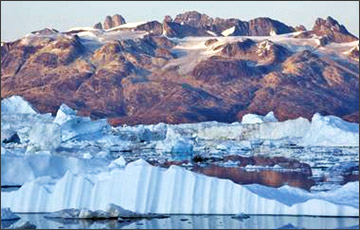Tons of water lost from world's glaciers, satellite reveals
by Steve Connor
The total volume of water that has melted from all of the world's
polar ice sheets, ice caps and mountain glaciers over the past decade
would repeatedly fill Britain's largest lake, Windemere, more than
13,000 times, according to one of the most comprehensive studies of the
Earth's frozen "cryosphere".
|

Cubic miles of ice has disappeared between 2003 and 2010 from
polar caps . |
Using a unique pair of satellites that have monitored the
disappearing ice over the entire surface of the globe, scientists
estimated that some 1,000 cubic miles of ice has disappeared between
2003 and 2010 - enough to cover the US in one-and-a-half feet of
water.The survey found that the melting of the cryosphere has been
responsible for raising sea levels by about half an inch over the same
period, equivalent to a rise of about 1.5mm a year.
This was on top of sea-level increases due to the thermal expansion
of seawater caused by rising ocean temperatures.
Data gathered by the Gravity Recovery and Climate Experiment (GRACE),
a joint satellite project run by Nasa and the German government, also
found that the amount of ice melting from the mountain glaciers and ice
caps that were not in Greenland or Antarctica was actually significantly
smaller than previous estimates had suggested.
Instead of contributing nearly 1mm of sea level rise per year as
previously suggested, some of the Earth's glaciers and ice caps,
especially in the Himalayas and other mountain ranges in Asia, were
melting significantly slower than expected, contributing about 0.4mm of
sea level rise per year - less than half the amount predicted.
One explanation for the previous overestimates could be that most of
the glaciers that have been studied intensively are at lower altitudes
and therefore more prone to melting.
Higher glaciers are colder and less susceptible and yet only 120
glaciers out of 160,000 glaciers and ice caps have been directly
measured from the ground.
The GRACE satellite experiment, however, covered the entire globe and
found that all the world's glaciers and ice caps combined, apart for
those in Greenland and Antarctica, had lost about 148 billion tonnes of
ice, or about 39 cubic miles, annually between 2003 and 2010. The
individual glaciers on the fringes of Greenland and Antarctic
contributed an additional 80 billion tons over the same period, the
study published in Nature found.
"This is the first time anyone has looked at all of the mass loss
from all of the Earth's glaciers and ice caps with GRACE," said John
Wahr, professor of physics at the University of Colorado at Boulder, who
was part of the research team that analysed the satellite data.
"The earth is losing an incredible amount of ice to the oceans
annually, and these new results will help us to answer important
questions in terms of both sea-level rise and how the planet's cold
regions are responding to global change."
Profe Jonathan Bamber, of Bristol University, said: "Melting glaciers
are an iconic symbol of climate change... they seem to have been
receding, largely uninterrupted, almost everywhere around the world for
several decades."
- The Independent
|

